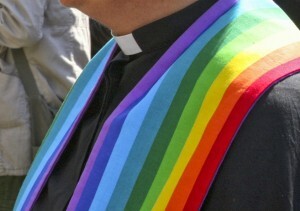Justice Minister Frances Fitzgerald at a press conference in Government Buildings yesterday, launching reform of student immigration and education
That should do it.
You may recall yesterday’s post concerning RTÉ reporter Brian O’Connell’s research on how some female asylum seekers – some aged 18 – are engaging in prostitution to supplement the weekly €19.10 they receive from the State.
Yesterday afternoon, Justice Minister Frances Fitzgerald was speaking at a press conference to launch new regulations for English language schools, when she was asked about Mr O’Connell’s report.
She told reporters she will be asking the Reception and Integration Agency (RIA) – which oversees the Direct Provision system – for a report on the matter, adding:
“We have no reports in relation to that, to date, but I will certainly be asking for a report and I would ask that anyone with information to make it available to the Gardaí.”
However, on this morning’s Today with Sean O’Rourke show, Mr O’Connell returned to the subject and said in 2007 and 2008, Ruhama did send a report to the Department of Justice – highlighting the issue of vulnerable women living in Direct Provision centres or hostels.
Mr O’Connell said the report states:
“On a practical level, we believe these hostels are not appropriate for this vulnerable target group. We have been advised by the women we work with, by managers of these hostels and by other service providers, throughout the country, that the hostels have become targets for pimps and other opportunists who seek to exploit the women through prostitution, recognising their poverty and vulnerability.”
Also in response to Mr O’Connell’s report yesterday, Minister Fitzgerald said:
“I would be concerned as well about any stereotyping that might take place in relation to those women in any media reports that are being made in relation to the issue because that’s obviously something of huge concern. We are talking about a vulnerable group of women and I certainly don’t want to see them further stigmatised.”
However, this morning, Mr O’Connell told the Today with Seán O’Rourke show:
“A lot of people heard anecdotally this was happening. This was the first time women have come forward and, if you like, taken ownership of their own story, Seán. The women wanted their stories to be told, they wanted to realities of their situation to be out there and they wanted to give a voice to what was happening to them on a daily basis.”
Listen back to this morning’s show in full here
Previously: ‘We Do It Out Of Desperation’




